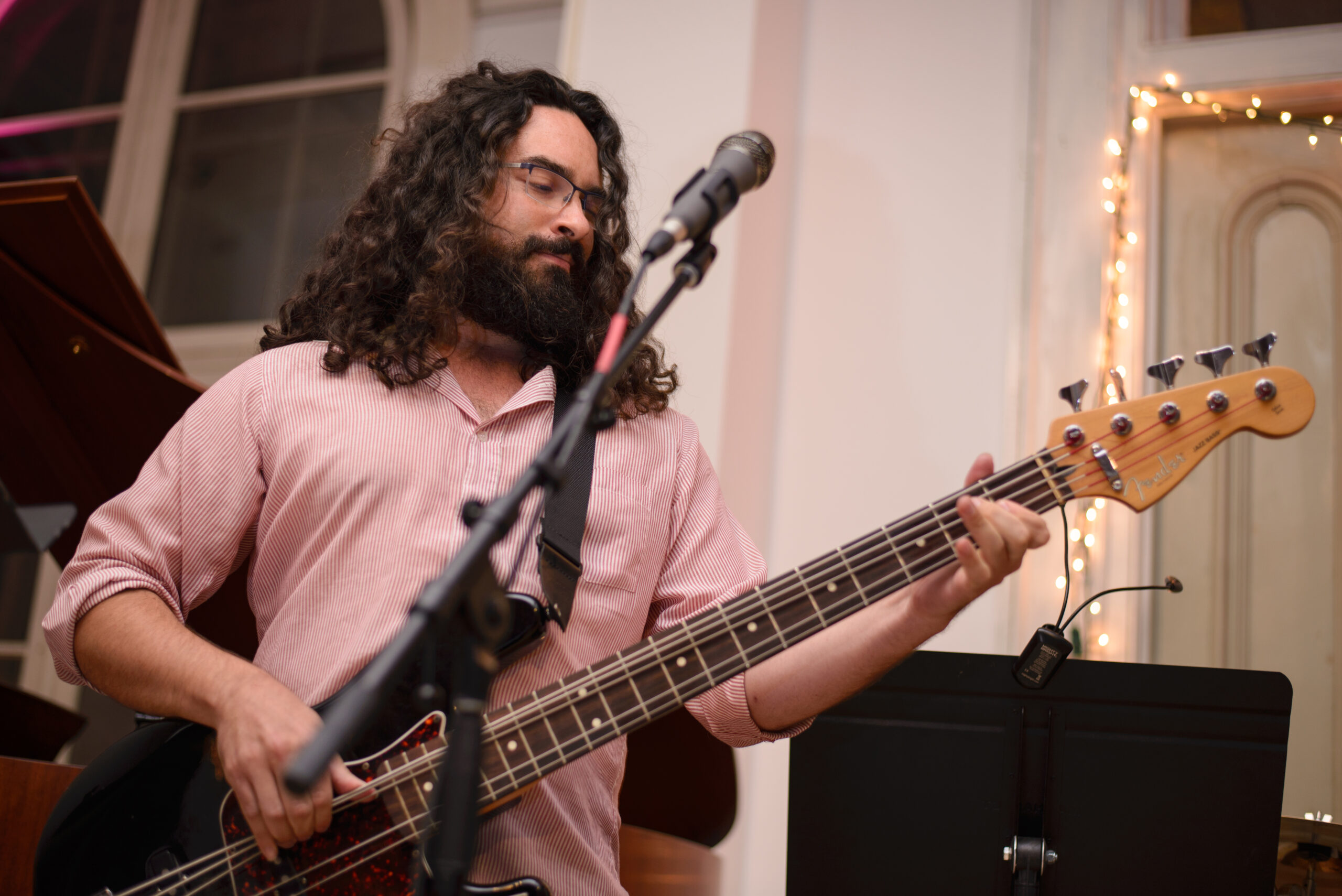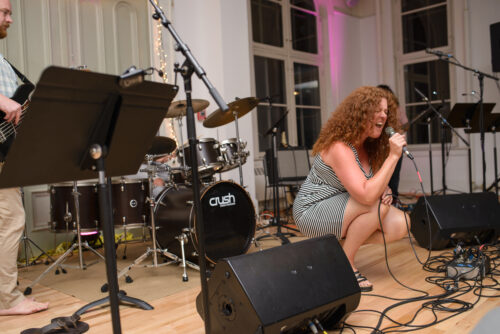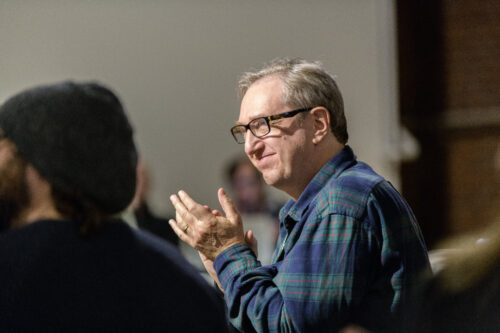Scoring a Movie: Lessons Learned from THE VAGINA MONOLOGUES and Other Adventures

A movie’s score might feel subtle, but its emotional impact is not. Understanding the power of empathy is the key to successfully scoring a movie.
By Rick Baitz
May 13th, 2025
When VCFA asked me to share my ideas on how one scores a movie, I sat for a while in my studio thinking…ok: What is important when it comes to composing music for a moving image?
I should have a list at top of mind—after all, I’ve been teaching film composition for almost 20 years, and have scored about 60 media projects of different kinds, from documentaries to narrative features to advertising to webisodes to animation to theatre projects designed for streaming.
But as a self-taught film composer who came to the field through the diverse worlds of concert music, with deep excursions into various folkloric traditions, it takes some concentrated thought to be able to give the reader a definitive guide on how to score a movie.
So I do not have any one particular technique for composing a film score. I approach every project anew, on its own terms, and don’t rely on any tricks or tropes to get myself through.
But what I do have is experience. In this article, I’ll walk you through:
- How to use connection and empathy
- Mirroring movie structure in your composing
- The lessons I learned from THE VAGINA MONOLOGUES
- The composer’s role in storytelling
- Why starting early matters
- Final thoughts on scoring a movie
Connection and Empathy in Movie Scoring
Here’s what I know: the composer has to connect, deeply, on an emotional, heartfelt level, with the project—and channel that into music.
For me, empathy is my “axe” for scoring a movie.
The composer should be aware of what the film is making you feel, and be sensitive to all the elements catalyzing that feeling: the story, the sound design, the editing, the lighting, and what is happening at any given moment on the screen.
The late, great director Sidney Lumet, in his book Making Movies, wrote:
“Almost every picture is improved by a good musical score. To start with, music is a quick way to reach people emotionally.”
It is also important to have a connection with the director (or whoever is in charge of the music; for documentaries, it is often the producer. Read more about this below). After all, the filmmaking team has to be satisfied with the music.
So in an ideal world, the composer and filmmaker are in sync on the aesthetics and purpose of the score.
Here’s a sample of the music from HBO’s THE VAGINA MONOLOGUES. This sample is a great example of mirroring the subject’s energy in the music.
Mirroring Movie Structure
Every year, hundreds of movies are released. Just last year, 569 movies were released in the U.S. and Canada.
Film music functions on a subconscious, or liminally conscious, level (sometimes just below the surface of the viewer’s awareness, sometimes rising above it) but in a space that resonates and activates the viewer’s emotions, sensations, thoughts, and memories. Sometimes, the viewer may not even be aware of it! (And usually isn’t.)
How does a composer do that?
By creating a musical structure that on some level has some equivalence to what is happening on the screen.
One example is the score I composed for HBO’s THE VAGINA MONOLOGUES—a documentary of
V’s, formerly Eve Ensler, stage play, featuring V performing the entire play, with interstitial commentary and backstage interviews.
There was corporate political intrigue with this project: the director was no longer involved, and various HBO staff and executives were weighing in on the music. After I had received several assigned and then retracted directives, and with a broadcast deadline looming, V herself stepped in and took control of the entire production, including the music, and came to my studio to work with me.
She and I connected immediately, and the collaborative effort to “find” the music for the project bore fruit.
The movie starts with V striding down the gritty streets of downtown Manhattan, talking about the process of getting inspiration for the play. Her energy is powerful, confident and positive. In my studio, she suggested going with “celebratory, rhythmically infectious ‘chick’ rock.”
We then proceeded to throw some songs we liked up against the opening scene, to see what kind of vibe would work, from The Eurythmics (Walking On Broken Glass) to The Pretenders (Back On The Chain Gang). V was looking for warm vocals to be utilized throughout the score.
Fortunately, this genre was in my wheelhouse—my early years were spent in Los Angeles, a creative petri dish of rock’n’roll, and I’ve played my share of it.
About a day before I would have probably lost this gig, I woke up with the music in my head: a hard-driving but—as she requested—celebratory rock anthem.
I called some New York session musicians who also played in Broadway pit orchestras (several from The Lion King), and put together a killer rock band. I needed players who could work in multiple styles, on multiple instruments, well versed in rock, and who could sight-read basically anything.
I had also heard about a downtown musical based on the life of Janis Joplin, Love, Janis, that featured the astonishing singer Cathy Richardson, and I bought myself a ticket and gave Cathy a listen. Her voice utterly floored me, and afterwards, I caught her on the streets of Greenwich Village and asked if she’d like to sing in the HBO version of THE VAGINA MONOLOGUES.
“Hell, yeah!” she answered.
(Later, Cathy became the lead singer in Jefferson Starship, with whom she still tours today.)
The Lessons I Learned from THE VAGINA MONOLOGUES
There were passages in THE VAGINA MONOLOGUES—which is actually about freeing women from cultural repression and from sexual violence—that were serious and introspective. For those scenes I deployed a small chamber ensemble: nylon string guitar, flute, and light soprano.
There are multifold lessons here.
- Keep going when things get tough. Trust in your own ability to find the musical truth for a scene or project.
- That trust must emerge not only from self-knowledge, but from having done the preparation. Immerse yourself, deeply, in all aspects of music, from history to theory to orchestration to notation. Every film composer I know is highly educated in a wide spectrum of musical composition.
- Hire the best freaking musicians you possibly can—this can make or break your movie score.
- Go the extra mile to make it the best product possible. Finding Cathy Richardson for THE VAGINA MONOLOGUES elevated the music to the highest level I could hope for.

Composers have many roles while scoring a movie, not the least of which is conveying emotion. Immerse yourself in the movie you’re working on so you can understand the vibe of the project.
The Composer’s Role in Storytelling
There is no one way to score a movie; every project is different.
The composer’s role may be to help move the story along, from scene to scene and shot to shot; or it may be to embody, and perhaps amplify, the narrative, and the thoughts or emotions that the characters are experiencing.
But music can also provide an alternative, parallel stratum that activates a deeper level of subliminal perception than that which dances in close marriage with the action on the screen.
For example, music can work on a mythological plane, even while helping tell the story.
Mychael Danna’s score to The Ice Storm employs the cyclical, cosmic repetitions of Native American flute and Indonesian gamelan in a story about the disaffected lifestyles of upper-class Connecticut suburbanites.
So while the ethnic elements reflect a sense of history, spirituality, and the circles of life, the classical orchestra operates on the immediate level, resonating with the day-to-day emotional experiences of the characters.
If Possible, Start the Scoring Process Early
It is also important to immerse oneself into the ethos and aesthetic of any movie one is scoring.
The earlier in the production process you can be involved, the better. Whenever possible, I have started by reading the script, even before filming has been completed. Several times I’ve come to the shoot, which is helpful for absorbing the overall feeling of a project.
An early movie that I scored, director Caroline Kava’s award-winning short Polio Water, was shot at a funeral home in the Bronx, NY. Observing the process of filming, with all my senses open, was an immersive experience that deepened my understanding of the gothic environment of the story, which in turn contributed to the mood of the music.
The success of that project led to several subsequent collaborations with the director. (And with the editor, Vermont College graduate Nola Schiff.)
Final Top Tips for Scoring a Movie
A few last tidbits on scoring movies, then I’ll let you go.
- Find a composer, or composers, you like, and watch every movie they’ve scored. Learn what works, and why. You may also do that with directors.
- Read some books on film scoring—I suggest Film Music – A Very Short Introduction, by Kathryn Kalinak, and Bernard Herrmann’s The Ghost and Mrs. Muir: A Film Score Guide, by David Cooper (which explores the semiotics of scoring movies through deep analysis of one film).
- Like it or not, learn the technology for film scoring. You need to get fluent with a DAW (digital audio workstation), and all related aspects of production.
- Hang out with filmmakers, actors, and theater people… make connections in the industry.
- Do some pro-bono scoring to get your chops up, before moving to the big time.
- Learn the nuts-and-bolts of the business, such as joining PRO’s (Performing Rights Organizations) and publishing and copyright basics.
- If possible, find a mentor or assistantship in the industry.
OK, now you’re set for life.
Just kidding. But hopefully, this gives you a solid foundation to enter into the vast and enormously rewarding world of scoring movies.
VCFA’s Music Composition program is renowned for its focus on giving students the tools they need to compose incredible and groundbreaking music. If you want a deeper and more personalized education on scoring a movie, VCFA has several faculty well versed in the field, including Rick Baitz and Don DiNicola, who wrote an expansion article on the many opportunities for new composers in the field of film scoring.

Rick Baitz
Faculty, VCFA Music Composition Program rickbaitz.comRick Baitz is an American composer, educator and pianist, known for his versatility across multiple platforms. Born in 1954, he was raised in Los Angeles, Rio de Janeiro, and Durban, South Africa—experiences that deeply influenced his musical style. Baitz’s compositions encompass chamber, electronic, vocal, orchestral, and film music, as well as works for theater, dance and multimedia installations. His concert pieces have been performed at venues such as Carnegie Hall, Merkin Hall, and the ISCM World New Music Days in Mexico City and Cape Town, South Africa. Notable works include Chthonic Dances, a string quartet inspired by his early experiences in Brazil and South Africa, Hall of Mirrors, a Juilliard-commissioned piece for percussion quartet and electronics, and River of January, also commissioned by Juilliard, for synthesizer and chamber ensemble. In the realm of film and television, Baitz has scored feature films, documentaries, animation and museum installations, including TCM’s WHAT SHE SAID: THE ART OF PAULINE KAEL as well as HBO’s THE VAGINA MONOLOGUES and National Geographic’s HEART OF AFRICA series.
As an educator, Baitz has taught at Vermont College of Fine Arts, The Juilliard School, Columbia University, Columbia College Chicago and Lincoln Center Institute. He was the founding director of BMI’s “Composing for the Screen” workshop, and from 2012 to 2016, served as Chair of VCFA’s Music Composition program, where he remains a core faculty member. Baitz earned his DMA from Columbia University, and holds Bachelor’s and Master’s degrees from Manhattan School of Music.
Awards and fellowships include BMI’s Classic Contribution Award; a Grammy nomination for arranging Wondrous Love—Feel The Spirit; Grand Prize and Chamber Music Award, Delius Composition Contest for River of January; and Fellowships to Tanglewood, the MacDowell Colony, Yaddo, the Edna St. Vincent Millay Colony and The Edward Albee Foundation. His most recent albums, Into Light (Innova) and River of January (Neuma Records) have been met with wide acclaim, with Amplified Magazine writing: “River of January is a masterpiece of contemporary music that beautifully blurs the boundaries between jazz and classical. With this album, Rick Baitz once again proves his extraordinary talent as a composer and arranger.”
Related Posts
- Beyond Quotation Marks: How to Write Dynamic Dialogue Jun 02, 2025
- Southern California's Newest MFA Sep 16, 2025
- A Closer Look at VCFA’s Tuition May 23, 2025

